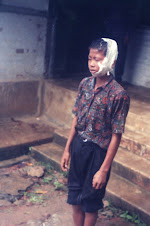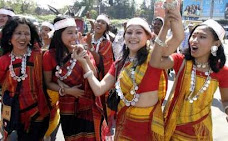Kapaeeng Watch News Release on Indigenous Peoples in Bangladesh: 8 September 2008
New Age, Dhaka, Wednesday, August 27, 2008
The ethnic minority leaders and academics at a discussion on Tuesday called upon the government to be respectful to the ethnic minority people's customary rights to land and forest resources which provide them with livelihood supports.
'They have both the spiritual and material relations with the forests, but we are not giving any recognition to them,' Sadeka Halim, a professor of sociology at Dhaka University, told the daylong workshop organised to mark the International Day of the World's Indigenous People.
She urged all concerned to allow the ethnic minority people's rights to land and forest, and seek their opinion on any development plan involving the areas where they live.
Presided over by Mesbah Kamal, general secretary of the Research and Development Collective, the workshop was addressed, among others, by H K S Arefin, a DU professor of anthropology, Sanjib Dran of Bangladesh Adivashi Forum, and Zannat e Ferdausi, director of the RDC.
The Research and Development Collective and the Voluntary Service Overseas organised the workshop at the LGED auditorium, where Bangladesh Adivashi Forum leader, Mangal Kumar Chakma and professor Ganesh Saren presented two keynote papers on the problems related to the land and forests in Chittagong Hill Tracts and plain land respectively.
Mangal Kumar Chakma's paper showed how vulnerable the ethnic minority people were now in the hills, while Gabesh Saren narrated their sufferings while living on the plain land.
They said the land of the ethnic groups was encroached upon by the influential quarters and the government and their access to the forest had shrunk with the depletion of the forest cover, declaration of new reserve forests and taking up of unsolicited development projects.
Mangal Kumar said land acquisition by the government in CHT, in the name of development, had displaced many people. With the influx of the Bengali settlers in CHT in late 19970s, the problem has been aggravated. The Bengalis also ousted many ethnic minority people from their homesteads.
He urged the government to make the land commission functional to settle the land related disputes in the areas. The commission has remained dysfunctional ever since it came into being after the signing of a deal between the government and the ethnic minority people in 1997.
The ethnic groups living on the plain land are more helpless than the people living in the hills, said Ganesh Saren.
Adivasi Odhikar Andolan executives
The Daily Star, Saturday, September 6, 2008
Prof HKS Arefin of Anthropology department of Dhaka University (DU) and Prof Mesbah Kamal of History department have been elected president and general secretary of Bangladesh Adivasi Odhikar Andolan (BAOA).
The election was held at its general meeting at Teachers Students Centre (TSC) auditorium on Thursday, says a press release.
Other office-bearers are vice presidents -- language movement veteran U Suwe Rakhain, journalist Sohrab Hasan, tribal leader Nirola Tonsong and Sarwar-e-Kamal Swapan; joint secretaries -- Jannat-E-Ferdousi and Karina Hasda, organising secretary -- Rakhi Mrong, international affairs secretary -- Sohel Hajong, publicity secretary -- Joyanta Acharya, office and communication secretary -- Mazharul Islam, information and research secretary -- journalist Nazrul Kabir, cultural secretary -- journalist Soumitra Deb, education secretary -- Hiron Mitra Chakma, seminar secretary -- Pari Chingtham, finance secretary -- Manhura Begum and law secretary -- Dilara Rekha.
Indigenous people demand constitutional rights
The Daily Star, Saturday, September 6, 2008
Indigenous leaders at a meeting yesterday called on the government to give constitutional rights to the indigenous people and take steps for an end to encroachment on their lands.
Bangladesh Adivasi Union (BAU) organised the meeting at Mukti Bhaban in the city's Purana Paltan area.
Indigenous leaders from Patuakhali, Bandarban, Netrokona, Bogra, Sirajganj, Jamalpur, Cox's Bazar and Dinajpur took part in the programme.
They said there is no alternative to establish a repression-free society in order to establish rights of the indigenous people, adding that they are fighting to get their constitutional rights for long.
The leaders also urged the government to protect their culture and heritage, including their traditional language, and ensure their right to land.
They called for a united effort to resist all kinds of repression against them.
The indigenous leaders at the meeting were critical of influential people who grabbed their land taking the advantage of their poverty and illiteracy.
Presided over by BAU Convener Rebeka Soren, the meeting was addressed by Khiroti Rani, Pavel Coch, Rupchand Barman, Binoy Majhi and Amin Kujur.
Ethnic minority people want education in mother tongue
New Age, Dhaka, September 6, 2008
Leaders of the ethnic minority communities, from both hill and plan land, of different districts on Friday called on the government to take necessary steps to stop occupation of land of the people in their areas.
They also urged the government to take initiative to introduce primary education system of the ethnic minority communities in their mother languages, saying that the ethnic minority people should be given their constitutional recognition.
The call came from an extended meeting of the Bangladesh Adivasi Union, held at Mukti Bhaban at Purana Paltan in Dhaka.
Chaired by Rebeka Soren, convener of the union, the meeting was also addressed, among others, by Woo Soo Rey of Patuakhali, Kasa Mong of Bandarban, Amin Kujur of Naogaon, Khagendra Hajong of Netrakona, Emil Hajda of Dinajpur, Thirati Rani of Chapainawabganj, Srimati Moormo of Phulbhari and Dhirendra Nath Mahato of Bogra.
Demanding constitutional recognition of the ethnic communities, Woo Soo Rey said, 'The ethnic minority people would be deprived of their basic rights as long as a repression-free society is not established.'
The land of the indigenous people was being encroached upon in various ways. This malpractice must be stopped, he said.
The land and homesteads of the indigenous people were being occupied indiscriminately by the influential quarters across the country, the speakers said, and called upon the ethnic groups to forge a unity to realise their demands.
They also demanded introduction of a permanent rationing system for them and exemplary punishment for the killers of Alfred Soren, Satyaban Hajong, Piren Snan, Kalpona Chakma and other indigenous people.
skip to main |
skip to sidebar

Military enforcement

Survive

Torture

Raped & Killed Indigenous Jumma Women

Militarization in CHTs

Religious destruction

Land Grabbing

Indigenous Jumma Villeges burnt down

Atrocities


CHTs is a number one of Millitary Zone in the World.

With Traditional Dress
nandawansa

Military enforcement

Survive

Torture

Raped & Killed Indigenous Jumma Women

Militarization in CHTs

Religious destruction

Land Grabbing

Indigenous Jumma Villeges burnt down

Atrocities
Embassy in Los Angeles
About Bangladesh
Refugee in Homeland

News Papers
Audio & Video
Actrocities & Tortures

CHTs is a number one of Millitary Zone in the World.
Jumma Photo Albums
Jumma Links
Jumma Women

With Traditional Dress
Blog Archive
About Me
- IJPNUSA
- The Indigenous Jumma People Net in North America is for the movement of minority Jumma indigenous people in Chittagong Hill Tracts in Bangladesh. E-mail:jpnus@yahoo.com Webpage:-http://jummapeoplenet.blogspot.com/
